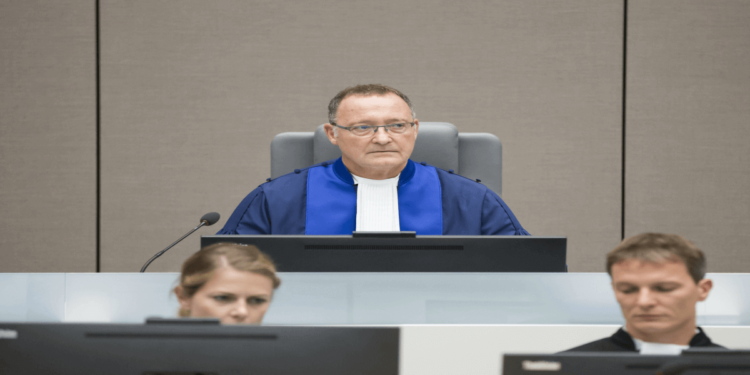By Tom Maliti, IJ Monitor
The International Criminal Court (ICC) has said seven witnesses will testify in the next phase of the trial of Dominic Ongwen, which is tentatively set to start on April 30.
During the next phase of trial victims’ lawyers will be able to present evidence highlighting the harm victims have suffered during the crimes Ongwen is alleged to have had a role in. Ongwen, who is charged with 70 counts of war crimes and crimes against humanity, is alleged to have committed the crimes between July 2002 and December 2005 while he was a commander of the Lord’s Resistance Army. He has pleaded not guilty to all counts.
Trial Chamber IX said in its March 6 decision it will allow four expert witnesses and three participating victims to testify. This is out of 13 witnesses that the two teams of lawyers representing two groups of victims applied to have testify. Paolina Massidda leads one team of victims’ lawyers, and Joseph Akwenyu Manoba leads the other.
Judges Bertram Schmitt (presiding), Péter Kovács, and Raul C. Pangalanglan said in their decision that the witnesses will not repeat the testimony of dual-status witnesses who have already provided evidence during the prosecution phase of the trial. Therefore, they said, Ongwen’s fair trial rights will not be affected.
In allowing the Massidda-led team to call an expert witness to testify about the psychological, social development, and behavioral well-being of children under 15 years old who take part in conflict, the chamber said it did not find the proposed evidence “repetitive.”
“It is true that several witnesses have given first-hand accounts of their own experiences related to this topic. However, the proposed testimony is different in the sense that, since it is evidence provided by experts, a more general conclusion on the entirety of the victims falling under this category can be drawn from this testimony which surpasses the account of an individual experience,” the chamber said in its decision.
“The proposed evidence also affects the issues in the case and is necessary for the determination of the truth, since two of the confirmed charges concern conscription of children under the age of 15 and their use to participate actively in hostilities. The personal interests of the victims are affected, since many of them were enlisted, conscripted or used to participate actively in hostilities while being under the age of 15,” the chamber said.
Trial Chamber IX gave similar reasons for accepting the other six witnesses to testify during the victims’ phase of the trial. The chamber declined to allow some of the proposed witnesses to testify because they would repeat evidence already heard in court or repeat the evidence of other witnesses in the victims’ phase of the trial.
The trial chamber also declined to hear three of the witnesses proposed by Manoba’s team because, according to the judges, they would be highlighting evidence that does not fall within the scope of the charges Ongwen is facing. Specifically, those witnesses would be testifying to “sexual violence against men and boys and the desecration of bodies.” The judges said that because the sexual crimes Ongwen has been charged with only relate crimes against women and girls, they do “not consider the hearing of this evidence [from male victims of sexual violence] to be appropriate and necessary for the determination of the truth.”
However, on March 12, lawyers representing these three rejected witnesses requestedthat the trial chamber reconsider its decision. The lawyers contend that the allegations of sexual violence against men and boys are relevant to other charges Ongwen faces, namely that they constitute other crimes from among those charged or “they are consequences of the crimes charged and their results are therefore part of the harm suffered by the victims.”
In directions given on October 13 as the Single Judge, Schmitt had anticipated that the prosecution would conclude its case by spring this year, and he laid out deadlines for lawyers representing victims to submit their proposed list of witnesses and any evidence they would be present. His directions also included deadlines for the defense to submit their list of witnesses and evidence they may be present.
To date, the prosecution has called 65 witnesses. The last four prosecution witnesses are scheduled to testify starting on Monday, March 19.
The witnesses that the lawyers for victims have been allowed to call are:
- Two survivors of the attack on the Lukodi IDP in 2004;
- One survivor of the attack on the Abok IDP camp, also in 2004;
- One expert on issues related to children and youth, particularly child soldiers (not named);
- Teddy Atim, who will testify about the impact of conflict on victim communities;
- Seggane Musisi, a Makerere University professor who will testify about Acholi culture in relation to conflict; and
- Daryn Reicherter, a Stanford University professor who will testify about the impact of sexual and gender-based crimes on a community.
The chamber directed the victims’ lawyers to submit their final list of witnesses and evidence list within a week of the prosecution filing notice it has concluded presenting its evidence. The prosecution is expected to file that notice shortly after the last of its witnesses has testified.
By the deadline the chamber has given, the victims’ lawyers are also expected to submit summaries of the anticipated testimonies, including Acholi translations, and to disclose any items they will use while presenting evidence.
It is unclear when the trial chamber will issue its decision regarding the request to reconsider the testimony of three witnesses on sexual violence against men and boys.
When the ICC was established in 2002, it was unique among international criminal courts or tribunals in having victims participate. Since then the Special Tribunal for Lebanon, the Extraordinary Chambers in the Courts of Cambodia, and the Extraordinary African Chambers have made the participation of victims part of their proceedings.
This article was first published on the International Justice Monitor website.







